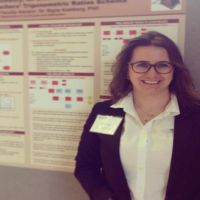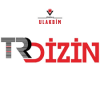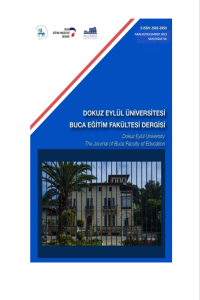Review
Research Article
Aim & Scope
Journal of Buca Faculty of Education aims to disseminate the findings of original scientific studies in all fields of education and to contribute to the scientific knowledge particularly in national and international area by creating common meanings of concepts peculiar to the education field.
Journal of Buca Faculty of Education accepts quantitative research, meta-analysis and review articles. Quantitative studies should be based on the theoretical framework using the appropriate methods and have not been published before. Meta-analysis should be related to using qualitative studies and review articles should be the ones in which a theory, a method or an approach is evaluated.
Author Guidelines
The title is to be written in font size 14, capitalizing the first letter of each word, and centered. In articles written in Turkish, under the Turkish title its English translation should be given, while in articles written in English, under the English title its Turkish translation should be provided.The author’s name and last name should be centered. If there is more than one author, their names should be written according to their contribution to the study.
Abstract
The abstract should be written in font size 10 and justified. It should not exceed 200 words or include any references. Following each abstract there should be 3-6 keywords describing the study in Turkish and English.
Headings and Sub-headings
Section headings should be capitalized and sub headings should be written in lower case and bold. The text should consist of the sections of Introduction, Methodology, Findings, Discussion and Conclusion according to the template.
Citations and References
Citations should be single spaced in font size 11 and APA 6 should be used.
Figures and Tables
Headings for the figures should be underneath and headings for the tables should be above the tables.
Font and Paragraph
· Manuscripts should be single-spaced in Times New Roman font 11.
· Paragraphs should be indented (1cm).
· After the ‘References’ section, an extended abstract of 750-1000 words should be written. If the article is written in Turkish then the extended abstract should be written in English, and if written in another language then the extended abstract should be written in Turkish.
· Page numbers should be on the right bottom.
· Page layout is 3 cm.
Extended English Abstracts
If the article is written in Turkish then the extended abstract between 750-1000 words should be written in English, and if written in another language then the extended abstract should be written in Turkish.
You can download the template and sample article on “Submissions”.
Ethical Principles and Publication Policy
Publication Ethics
The Journal of Buca Faculty of Education is an open access journal distributed under the terms of the Creative Commons Attribution-NonCommercial-ShareAlike 4.0 International. There is no article processing and submission charges for our journal.
Journal of Buca Faculty of Education Journal is based on publication ethics and Malpractice obligations for editors, authors and referees determined by the COPE (Code of Conduct for Journal Editors) in the periodical published from 01.06.2018.
Responsibilities of Editors
Fair play and editorial independence
Editors evaluate submitted manuscripts exclusively on the basis of their academic merit (importance, originality, study’s validity, clarity) and its relevance to the journal’s scope, without regard to the authors’ race, gender, sexual orientation, ethnic origin, citizenship, religious belief, political philosophy or institutional affiliation. Decisions to edit and publish are not determined by the policies of governments or any other agencies outside of the journal itself. The Editor-in-Chief has full authority over the entire editorial content of the journal and the timing of publication of that content.
Confidentiality
Editors and editorial staff will not disclose any information about a submitted manuscript to anyone other than the corresponding author, reviewers, potential reviewers, other editorial advisers, and the publisher, as appropriate.
Disclosure and conflicts of interest
Editors and editorial board members will not use unpublished information disclosed in a submitted manuscript for their own research purposes without the authors’ explicit written consent. Privileged information or ideas obtained by editors as a result of handling the manuscript will be kept confidential and not used for their personal advantage. Editors will recuse themselves from considering manuscripts in which they have conflicts of interest resulting from competitive, collaborative, or other relationships/connections with any of the authors, companies or institutions connected to the papers; instead, they will ask another member of the editorial board to handle the manuscript.
Publication decisions
The editors ensure that all submitted manuscripts being considered for publication undergo peer-review by at least two reviewers who are expert in the field. The Editor-in-Chief is responsible for deciding which of the manuscripts submitted to the journal will be published, based on the validation of the work in question, its importance to researchers and readers, the reviewers’ comments, and such legal requirements as are currently in force regarding libel, copyright infringement and plagiarism. The Editor-in-Chief may confer with other editors or reviewers in making this decision.
Involvement and cooperation in investigations
Editors (in conjunction with the publisher and/or society) will take responsive measures when ethical concerns are raised with regard to a submitted manuscript or published paper. Every reported act of unethical publishing behaviour will be looked into, even if it is discovered years after publication. Editors follow the COPE Flowcharts when dealing with cases of suspected misconduct. If, on investigation, the ethical concern is well-founded, a correction, retraction, expression of concern or other note as may be relevant, will be published in the journal.
Duties of Reviewers
Contribution to editorial decisions
Peer review assists editors in making editorial decisions and, through editorial communications with authors, may assist authors in improving their manuscripts. Peer review is an essential component of formal scholarly communication and lies at the heart of scientific endeavour.
Promptness
Any invited referee who feels unqualified to review the research reported in a manuscript or knows that its prompt review will be impossible should immediately notify the editors and decline the invitation to review so that alternative reviewers can be contacted.
Confidentiality
Any manuscripts received for review are confidential documents and must be treated as such; they must not be shown to or discussed with others except if authorized by the Editor-in-Chief (who would only do so under exceptional and specific circumstances). This applies also to invited reviewers who decline the review invitation.
Standards of objectivity
Reviews should be conducted objectively and observations formulated clearly with supporting arguments so that authors can use them for improving the manuscript. Personal criticism of the authors is inappropriate.
Acknowledgement of sources
Reviewers should identify relevant published work that has not been cited by the authors. Any statement that is an observation, derivation or argument that has been reported in previous publications should be accompanied by the relevant citation. A reviewer should also notify the editors of any substantial similarity or overlap between the manuscript under consideration and any other manuscript (published or unpublished) of which they have personal knowledge.
Disclosure and conflicts of interest
Any invited referee who has conflicts of interest resulting from competitive, collaborative, or other relationships or connections with any of the authors, companies or institutions connected to the manuscript and the work described therein should immediately notify the editors to declare their conflicts of interest and decline the invitation to review so that alternative reviewers can be contacted.
Unpublished material disclosed in a submitted manuscript must not be used in a reviewer’s own research without the express written consent of the authors. Privileged information or ideas obtained through peer review must be kept confidential and not used for the reviewer’s personal advantage. This applies also to invited reviewers who decline the review invitation.
Duties of Authors
Reporting standards
Authors of original research should present an accurate account of the work performed and the results, followed by an objective discussion of the significance of the work. The manuscript should contain sufficient detail and references to permit others to replicate the work. Review articles should be accurate, objective and comprehensive, while editorial 'opinion' or perspective pieces should be clearly identified as such. Fraudulent or knowingly inaccurate statements constitute unethical behaviour and are unacceptable.
Data access and retention
Authors may be asked to provide the raw data of their study together with the manuscript for editorial review and should be prepared to make the data publicly available if practicable. In any event, authors should ensure accessibility of such data to other competent professionals for at least 10 years after publication (preferably via an institutional or subject-based data repository or other data centre), provided that the confidentiality of the participants can be protected and legal rights concerning proprietary data do not preclude their release.
Originality and plagiarism
Authors should ensure that they have written and submit only entirely original works, and if they have used the work and/or words of others, that this has been appropriately cited. Publications that have been influential in determining the nature of the work reported in the manuscript should also be cited. Plagiarism takes many forms, from "passing off" another's paper as the author's own, to copying or paraphrasing substantial parts of another's paper (without attribution), to claiming results from research conducted by others. Plagiarism in all its forms constitutes unethical publishing behaviour and is unacceptable.
Multiple, duplicate, redundant or concurrent submission/publication
Papers describing essentially the same research should not be published in more than one journal or primary publication. Hence, authors should not submit for consideration a manuscript that has already been published in another journal. Submission of a manuscript concurrently to more than one journal is unethical publishing behaviour and unacceptable.
The publication of some kinds of articles (such as clinical guidelines, translations) in more than one journal is sometimes justifiable, provided that certain conditions are met. The authors and editors of the journals concerned must agree to the secondary publication, which must reflect the same data and interpretation of the primary document. The primary reference must be cited in the secondary publication.
Authorship of the manuscript
Only persons who meet these authorship criteria should be listed as authors in the manuscript as they must be able to take public responsibility for the content: (i) made significant contributions to the conception, design, execution, data acquisition, or analysis/interpretation of the study; and (ii) drafted the manuscript or revised it critically for important intellectual content; and (iii) have seen and approved the final version of the paper and agreed to its submission for publication. All persons who made substantial contributions to the work reported in the manuscript (such as technical help, writing and editing assistance, general support) but who do not meet the criteria for authorship must not be listed as an author, but should be acknowledged in the "Acknowledgements" section after their written permission to be named as been obtained. The corresponding author should ensure that all appropriate coauthors (according to the above definition) and no inappropriate coauthors are included in the author list and verify that all coauthors have seen and approved the final version of the manuscript and agreed to its submission for publication.
Disclosure and conflicts of interest
Authors should—at the earliest stage possible (generally by submitting a disclosure form at the time of submission and including a statement in the manuscript)—disclose any conflicts of interest that might be construed to influence the results or their interpretation in the manuscript. Examples of potential conflicts of interest that should be disclosed include financial ones such as honoraria, educational grants or other funding, participation in speakers’ bureaus, membership, employment, consultancies, stock ownership, or other equity interest, and paid expert testimony or patent-licensing arrangements, as well as non-financial ones such as personal or professional relationships, affiliations, knowledge or beliefs in the subject matter or materials discussed in the manuscript. All sources of financial support for the work should be disclosed (including the grant number or other reference number if any).
Acknowledgement of sources
Authors should ensure that they have properly acknowledged the work of others, and should also cite publications that have been influential in determining the nature of the reported work. Information obtained privately (from conversation, correspondence or discussion with third parties) must not be used or reported without explicit, written permission from the source. Authors should not use information obtained in the course of providing confidential services, such as refereeing manuscripts or grant applications, unless they have obtained the explicit written permission of the author(s) of the work involved in these services.
Hazards and human or animal subjects
If the work involves chemicals, procedures or equipment that have any unusual hazards inherent in their use, the authors must clearly identify these in the manuscript. If the work involves the use of animals or human participants, the authors should ensure that all procedures were performed in compliance with relevant laws and institutional guidelines and that the appropriate institutional committee(s) has approved them; the manuscript should contain a statement to this effect. Authors should also include a statement in the manuscript that informed consent was obtained for experimentation with human participants. The privacy rights of human participants must always be observed.
Peer review
Authors are obliged to participate in the peer review process and cooperate fully by responding promptly to editors’ requests for raw data, clarifications, and proof of ethics approval, patient consents and copyright permissions. In the case of a first decision of "revisions necessary", authors should respond to the reviewers’ comments systematically, point by point, and in a timely manner, revising and re-submitting their manuscript to the journal by the deadline given.
Fundamental errors in published works
When authors discover significant errors or inaccuracies in their own published work, it is their obligation to promptly notify the journal’s editors or publisher and cooperate with them to either correct the paper in the form of an erratum or to retract the paper. If the editors or publisher learns from a third party that a published work contains a significant error or inaccuracy, then it is the authors’ obligation to promptly correct or retract the paper or provide evidence to the journal editors of the correctness of the paper.
Focus and Scope
“Journal of Buca Faculty of Education” is a national peer-refereed academic journal which publishes scholarly articles in the field of education. It is biannually published online (June and December). It welcomes articles by national and international academics in the field of Educational Sciences in four languages (Turkish, English, French, and German). There is no fee for the manuscript publication. The Editorial board has the authorization to increase the annual issues. No fee is charged for any period of our journal. The publication board may decide to issue an additional / special number or special issue of the congress / symposium.
Review Process
The manuscripts are sent to two referees. The review processes are aimed at being completed in three months after submission depending on reviewers' feedback and final decisions.
Price Policy
Buca Eğitim Fakültesi Dergisi için herhangi bir makale işlem ve gönderim bedeli bulunmamaktadır.
Indexes
Citation Indexes
Other Indexes
Journal Boards
Owner

Editor-in-Chief

Kemal Yurumezoglu is an professor in the Department of Special Education (Gifted Education) at Dokuz Eylul University, Turkey. He received his master’s degree in physics education in 2000 from the University of Paris Diderot (Paris 7), France, and his PhD in science education in 2005 from the University of Strasbourg, France. His research interests are in conceptual physics, gifted education, STEAM education and inquiry-based physics activities.
Editors


Field Editors

Saint-Joseph Fransız Lisesi (1989-1997)
Lisans: İstanbul Teknik Üniversitesi-Makina Mühendisliği (1997-2003)
Yüksek Lisans: İstanbul Üniversitesi-Fransız Dili Eğitimi (2003-2007)
Doktora: İstanbul Üniversitesi-Fransız Dili Eğitimi (2009-2015)



Compositors



Editorial Editor

Journal Secretary












